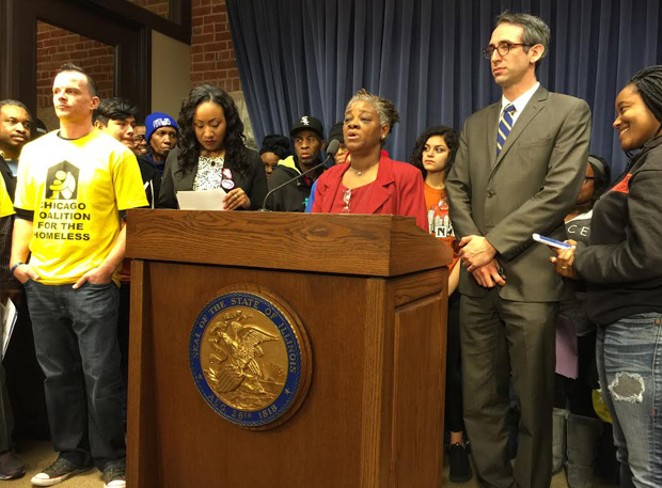
“When I looked at all the people that were against this bill I was really appalled, because none of them could live off the wages that we are requiring these people to live off of,” Flowers said.
Based on the projected cost of living, a livable wage for a single person in Illinois is $15.63 per hour, which is expected to increase to $17.60 by 2022.
Rep. Will Guzzardi, D-Chicago, introduced a separate bill to increase the minimum wage gradually to $15 per hour by 2022, which would make it $9 per hour next year. The bill was approved in committee.
“I am hopeful that we are going to be able to call it up for a vote (in the House) at the end of April and get it passed,” he said.
The minimum wage in Illinois is $8.25 per hour, a dollar higher than the federal level at $7.25 per hour.
Of the 3.2 million hourly workers in Illinois, 101,000 of them, or 3.2 percent, are at or below the prevailing federal minimum wage.
Mark Seldis, a minimum-wage worker from Chicago, told a House committee low wages rendered him homeless.
“I have known a few workers who chose homelessness for a time so they could save some money, unrealistically thinking they will easily be able to come up with the savings they made,” he said.
Valarie Thomas, a health care worker from Belleville, also testified in the hearings, stating she struggles to make ends meet with a $10.25 per hour wage.
“If the opponents of a $15 per hour minimum wage want to come with me to walk a day in my shoes, they are more than welcome,” she said.
Thomas, who has worked for Community Care for five years, has received an annual 5-cent increase. She added workers are not asking for an increase out of greed.
“Employers who exploit low-wage workers are not going to raise wages out of the goodness of their hearts,” she said. “We just want to get by…and make sure the people we love are cared for.”

“I am really tired of working poor people being the bogeyman in the way that we talk about this,” Wallace said. “Let’s change the narrative, because you’re receiving welfare too.”
Rep. Reginald Phillips, R-Charleston, who is a small employer, said businesses work themselves out and government involvement only negatively affects them.
”I have probably 400 CNAs [certified nursing assistants] working for me,” he said. “We can’t get CNAs for less than $11.50 an hour in the downstate part of Illinois. It’s a supply and demand thing.”
Mark Grant, Illinois director of the National Federation of Independent Business, said members oppose any minimum wage increase and government involvement on the issue.
Grant said raising the minimum wage would force businesses to raise all other wages as well.
“Proponents would say, ‘That’s a very good thing.’ It’s only a good thing if the business that is paying the wages can afford it,” he said.
Grant said many small businesses in the state cannot afford to pay higher wages because their profit margin and sales are not high enough.
Doug Knight, owner of Knight’s Action Park in Springfield, believes people who “claim to be stuck at minimum wage” are not being fully honest.
“In my world, if you’re not happy with where you’re working…if you don’t like how much you make…you are going to go out and look for another job,” he said.
Knight said he believes legislators should replace subsidies with “coaching” for poor workers.
“Rather than just handing out money, we should be talking to people about how to make their lives better and give them a little motivation,” he said.
Contact Debby Hernandez at [email protected].















